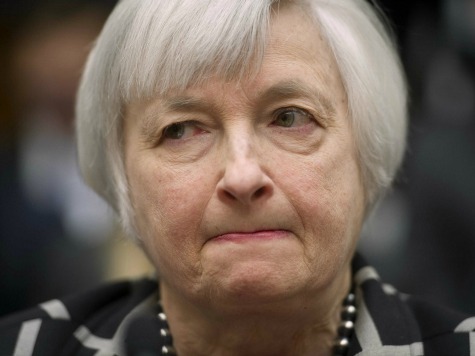In this installment of Washington & Wall Street, we take readers of Breitbart News into the obscure world of the bond market and an important subset, namely the world of mortgage loan servicing and the “to be announced” (TBA) market for mortgages. In both cases, the actions of the Federal Reserve Board are distorting the markets and arguably setting banks, the housing market, and U.S. consumers up for a future “surprise” right around election time.
Back in November, the Federal Reserve started to taper its purchases of Treasury bonds and mortgage securities. As part of this not-so-covert shift in policy, the Fed stopped its risk-selling operations in the TBA market. Why is TBA important? Because after the Treasury market, the TBA market is the largest bond market in the world, where the U.S. housing sector prices and hedges future commitments to fund mortgage loans.
In the past six months or so, the flow of hedging transaction in the TBA market has dropped from $1.5 billion per day to barely $1 billion, a decline that mirrors the drop in new mortgage loan originations. During this same period, lenders seeking to hedge their interest rate exposure on new mortgages in the TBA market have been faced with a very unfriendly market. To “roll” a commitment to fund mortgage from the current month to, for example, May 2014, now costs almost half a point. Since the Fed has stopped “selling” exposure into the next month, mortgage lenders are getting killed on hedging activities.
But, of course, one must understand that the Fed is trying to help the mortgage market via quantitative easing and other operations. Or is this really the case? The discussions with market participants by Washington & Wall Street, in fact, suggest that the Fed is actually hurting the mortgage market by imposing losses on lenders seeking to hedge new mortgage production. This hazard comes on top of an extremely competitive market for mortgage lending, where profitability has evaporated many bank and non-bank lenders alike.
What market participants suggest is that mortgage servicing, especially the mark-up on mortgage servicing rights, or “MSRs,” is currently subsidizing what is overall an unprofitable mortgage lending market. But since the Fed is currently withdrawing support for mortgage bonds via QE and has also stopped selling the “roll” from the current month into forward months, mortgage lending is becoming even less profitable – and this even with the offset of higher valuations for the mortgage servicing business.
Why are MSRs important? The flow of “stupid money” into MSRs and other mortgage servicing assets has been brisk, thanks to the Fed’s grotesque manipulation of the money markets over the past several years. MSRs have been trading hands at five or even six times the annual cash flow, a huge premium from the multiples seen prior to the crisis which were closer to two to three times the cash flow.
These frothy valuations provided a balance sheet offset for the operating losses lenders are suffering, both on lending and on interest rate hedges. W&WS hears from a number of market participants that losses on TBA hedges in Q1 2014 could equal the “surprises” suffered by many market participants after the now infamous press conference by former Fed Chair Ben S. Bernanke last summer.
“Two/three years ago we started seeing the major servicers/aggregators marking down their MSR valuations and selling in bulk,” said Adam Quinones, head of Mortgages and Asset Backed Securities at Thomson Reuters. He stated that the large banks wanted to recover lost cash-flows and were dealing with Basel III, as well as lawsuits; therefore, selling their MSRs made sense.
Quinones continued:
Buyers are plentiful right now. Never-before seen investors have entered the MSR space. Private equity, REITs, hedge funds, etc. More MSR offerings have been announced over the past six months than in any other era. Mortgage lenders are happy to sell because they need cash to stay competitive. All is going well right now, but at some point, the bid will not be supported by fair value modeling. Prices will hit a ceiling, buyers will re-visit their models, and the market will reprice.
Confirming Quinones’ view, the fair value of all mortgage servicing rights held by U.S. banks tracked by the FDIC jumped from $38 billion at the end of 2012 to $47 billion at the end of last year, a mere 23% increase in 12 months. But when the “dumb money” from Wall Street currently chasing MSRs and other types of mortgage assets goes away, the mortgage lending market is likely to see a number of players exit in a hurry.
When the bubble bursts in the mortgage market, credit capacity in the mortgage lending sector will contract. Getting a home loan will then become even more difficult for millions of Americans. All of this will probably unfold just in time for the 2014 election in November, giving Republicans fuel to add to the fire – assuming they know what to say. And our diligent public servants at the Fed, who are the cause of it all, will be largely clueless as to what is happening in the mortgage sector.
Mr. Whalen is the co-author of a new book scheduled for publication in the Second Half of 2014 by John Wiley & Sons: “Financial Stability: Fraud, Confidence & the Wealth of Nations.” Click the link below for more information or to be added to the mailing list.

COMMENTS
Please let us know if you're having issues with commenting.